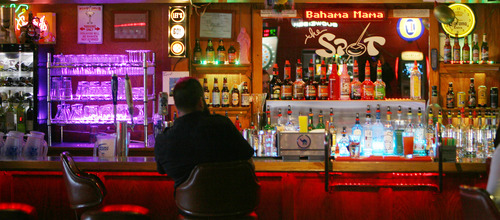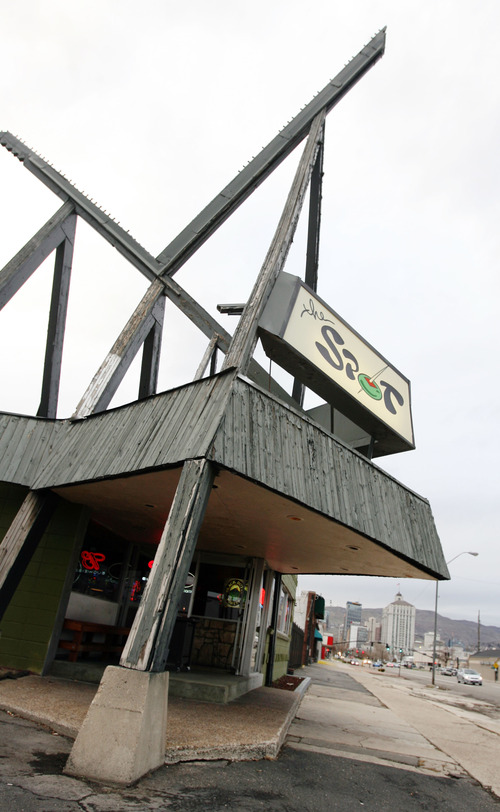This is an archived article that was published on sltrib.com in 2013, and information in the article may be outdated. It is provided only for personal research purposes and may not be reprinted.
It sounds like a plot for a gangster movie.
A bar owner acquires some booze from somewhere other than the usual supplier, who maintains a stranglehold on the market as the only place anybody can buy hooch. The supplier gets wind of this, through another bar owner (who quickly gets labeled a snitch and a rat), and sends in its muscle threatening to shut down the offending bar.
No thumbs were broken, no suspicious fires were ignited and no bricks were thrown through windows. But the bar owner can't go to the law — because the supplier is the law.
It's not a gangster movie. It's just another day at Utah's Department of Alcohol Beverage Control.
As my Tribune colleague Dawn House reported last week, DABC officers went undercover in May to bust The Spot, a bar at 870 S. Main St. in Salt Lake City, on accusations of bootlegging.
That word "bootlegging" sounds so old-school, as if the bar were brewing up bathtub gin or smuggling whiskey in from Canada under the nose of Eliot Ness. But the reality is more prosaic: The DABC cops bought two bottles of beer, then confiscated eight more bottles, because they were brands the DABC doesn't sell in Utah.
See, the DABC doesn't just act as the police where liquor is concerned, but it also controls the liquor at the source. Bars, restaurants and stores can buy booze only from state liquor stores or from licensed businesses (like beer wholesalers).
The allegations against The Spot are "grave," House reported a DABC spokeswoman as saying, and could mean that the bar's liquor license can be revoked or suspended — and that the bar could face fines ranging from $1,000 to $25,000.
The DABC investigation was sparked, House reported, by a complaint from another bar owner, Mark Alston, who runs The Bayou at 645 S. State St. — about three blocks away from The Spot. DABC officers used a list of brands Alston provided when they busted The Spot.
Alston, in an email to the Tribune, said his intent was to sell the particular brands of beer The Spot was carrying. "We simply asked the DABC how to get the beers that The Spot was selling as we had many customers asking about them," he wrote.
The brands in question, besides entering the state without DABC getting its cut, are also notable for their levels of irony.
One, Alaskan Winter Ale, hails from a state famed for its rugged independence and strong libertarian streak. Another, 90 Shilling Ale (from Colorado's Odell Brewing Co.), is named for an old Scottish method of taxing beer based on alcohol content. A third brand, Coors' Batch 19 Pre-Prohibition Lager, is modeled after a beer made before there was such a thing as liquor control.
News of the bust has prompted a small backlash against Alston and The Bayou. In the comments posted online to House's initial story, and on The Bayou's Facebook page, angry customers accuse The Bayou of having "ratted out" The Spot. Some have sworn never to spend money at The Bayou again (if they ever did before).
DABC's tough enforcement, and its monopoly over liquor supply, fosters an atmosphere that encourages tattling among bar owners. In 2009, Brewvies Cinema Pub got hit with a $1,500 fine because it showed a movie with nudity in it, "The Hangover" — after a complaint by local strip clubs that aren't allowed to serve booze where the nudity is happening.
It's easy for bars like The Spot and The Bayou to feel like they're over a barrel. DABC, by controlling both access to booze and the enforcement of liquor laws, holds the bars' livelihoods in its hands. Its rulings are strict and harsh, and the only option for appeal is a lengthy and expensive court case — something struggling businesses can scarcely afford. Also, DABC may be the only regulatory agency whose board is made up mostly of people who never use the product being regulated.
On its Facebook page, The Bayou says it's as much a victim as The Spot. "We will continue working with the crappy system we are stuck with and keep trying to bring the best beers into Utah we can," the bar posted.
It is a crappy system — but for DABC it's a money-maker.
The DABC, on its website, pontificates that "the purpose of control is to make liquor available to those adults who choose to drink responsibly — but not to promote the sale of liquor. By keeping liquor out of the private marketplace, no economic incentives are created to maximize sales, open more liquor stores or sell to underage persons."
Elsewhere on the agency's website is a list of advantages to being a control state. At the top of the list: "A major source of income for the state." So it's not about the money, but it is about the money.
As Sam Spade said in "The Maltese Falcon": "The cheaper the crook, the gaudier the patter."
And the patter doesn't get any gaudier than when uttered by the people at the top of this liquor racket. These are the godfathers, with the emphasis on "God": the Utah Legislature.
These lawmakers are the fine, upstanding ladies and gentlemen who repeatedly decry the "nanny state" and constantly talk about how government should stay out of the way of free enterprise. In the next breath, these same lawmakers tout public safety as an excuse to add more ridiculous restrictions to a legally sold product. It's all done while appropriating money and resources to keep alive a massive, all-powerful bureaucracy that micromanages an entire industry.
People always dismiss Utah's liquor laws as a joke, and certainly out-of-town observers are amused to see the gymnastics servers must perform to fulfill the sillier regulations. But for those of us who live here, the joke stopped being funny a long time ago.
Sean P. Means writes The Cricket in daily blog form at http://www.sltrib.com/blogs/moviecricket. Email him at spmeans@sltrib.com. Follow him on Twitter @moviecricket, or on Facebook at http://www.facebook.com/seanpmeans.





